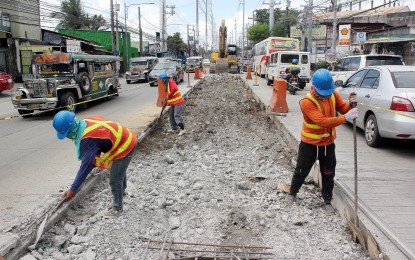
(File photo)
MANILA – A lawmaker at the House of Representatives on Monday said the proposed Maharlika Investment Fund is designed to mobilize savings to finance long-term investments such as big-ticket infrastructure works and other priority development programs of the government.
Camarines Sur Rep. Luis Raymund Villafuerte said the proposed public investment venture would help President Ferdinand R. Marcos Jr. deliver on his campaign promise to improve the lives of all Filipinos.
Given the current administration's limited fiscal space resulting mainly from the enormous spending by the previous government on Covid-19 response, Villafuerte appealed to all Filipinos to support the President’s appeal for the public to give House Bill (HB) 6608 a chance and wait for the Congress to hammer out what was described as the “perfect” version of this sovereign fund.
“Our people should give it a try and let the Congress come up with a bill acceptable to the people and with the proper safeguards,” Villafuerte said. “I support Malacañang’s wealth investment plan."
He said there is "no harm in trying" as long as the proper safeguards are there.
"At the end of the day, it's up to the Congress to really come out with a good measure," he added.
For starters, Villafuerte said the initial reservations over certain features of the MIF bill such as the use of Government Service Insurance System (GSIS) and Social Security System (SSS) pension funds, along with the Fund’s board chairmanship by the President, were quickly addressed with the major changes or amendments made at the House committee level.
He said the current proposal already excluded the GSIS and SSS pension funds from the MIF’s funding source, and put the Finance Secretary as the chairman, in lieu of the President, as proposed in the original bill of the would-be Maharlika Investment Fund Corp. (MIC).
The number of independent directors in the MIC Board was also raised from the original two to the current five independent directors to increase private-sector participation.
He also pointed out that the initial investment, under the House-approved version, will come only from the investible funds of the Land Bank of the Philippines (LandBank) and Development Bank of the Philippines (DBP), gaming revenues of the Philippine Amusement and Gaming Corp. (PAGCOR) and other state-run gaming operators, and dividends of the Bangko Sentral ng Pilipinas (BSP).
He also cited a statement by Asian Development Bank (ADB) Philippine country representative Kelly Bird that a sovereign investment fund can help an economy “deepen” its capital market, and create “a large institutional investor, and that allows mobilization of savings within the economy for long term investments including infrastructure.”
Speaker Martin Romualdez, meanwhile, welcomed the recent nationwide survey showing that half of Filipinos support the fund's creation.
“We are happy with the survey, which to us means that we are on the right track in advocating the establishment of this sovereign wealth fund, which is intended to benefit future generations of Filipinos,” Romualdez said. “It shows that our advocacy has the support not just of major business groups but of the general population as well."
The mobile-based poll was conducted by data research firm Tangere from Dec. 8 to 10, before the House of Representatives approved the MIF bill on the third and final reading last Thursday.
The survey had 2,400 respondents: 12 percent from Metro Manila, 23 percent from North and Central Luzon, 22 percent from South Luzon, 20 percent from Visayas, and 23 percent from Mindanao. It had a margin of error of 2.191 percent.
According to Martin Peñaflor, chief executive officer and founder of data research firm Tangere, 2,010 or 83.75 percent of the 2,400 respondents were aware of the MIF bill.
He said of those aware, 54.08 percent either strongly supported (21.84 percent) or somewhat supported (32.24 percent) the bill’s passage into law, while 21.34 percent were neutral and 24.58 percent either somewhat or strongly opposed the measure.
Peñaflor said 45.87 percent agreed to have government institutions as MIF contributors, while six out of 10 approved of having the President to head the management of the fund.
He said half of those aware of the MIF bill either strongly believed (22.39 percent) or somewhat believed (27.01 percent) that the establishment of the MIF could be safeguarded from corruption.
Some 65.47 percent were of the opinion that its creation was timely, 56.67 percent expressed the view that it would help the economy grow, and 57.86 percent strongly or somewhat believed that the fund would finance government projects, he added.
Peñaflor pointed out that 73.14 percent “also believe that the government should be coming up with creative sources of revenue, other than raising or requiring additional taxes.”
HB 6608, which is principally authored by Romualdez, called for the establishment of the MIF to promote economic development by making strategic and profitable investments in key sectors. It also earmarked at least 25 percent of the net profits of the MIC for social welfare programs.
It was approved on final reading with 279 affirmative votes, six against and no abstentions after Marcos certified the passage of the bill as urgent. (PNA)
